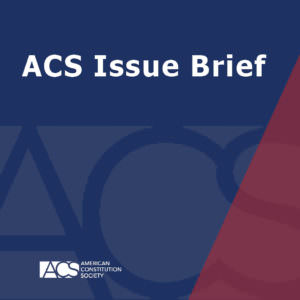Immigration Assistance for Indigent Defenders
Legal Director, National Immigration Project
Albert Coates Professor of Public Law and Government, University of North Carolina School of Government
October 26, 2010
 ACS is pleased to distribute “Immigration Assistance for Indigent Defenders,” by Sejal Zota, an Immigration Law Specialist, and John Rubin, a Professor of Public Law and Government, at the University of North Carolina School of Government. This paper is part of a series of Issue Briefs that ACS is publishing focused on ideas for a role the federal government can play in helping improve indigent defense systems around the country. The series builds on the interest in pursuing reform expressed by Attorney General Eric Holder, Congress, and other federal policymakers to address the crisis in indigent defense that has existed since the Supreme Court's 1963 decision in Gideon v. Wainwright, the landmark case establishing the right to counsel for indigent defendants.
ACS is pleased to distribute “Immigration Assistance for Indigent Defenders,” by Sejal Zota, an Immigration Law Specialist, and John Rubin, a Professor of Public Law and Government, at the University of North Carolina School of Government. This paper is part of a series of Issue Briefs that ACS is publishing focused on ideas for a role the federal government can play in helping improve indigent defense systems around the country. The series builds on the interest in pursuing reform expressed by Attorney General Eric Holder, Congress, and other federal policymakers to address the crisis in indigent defense that has existed since the Supreme Court's 1963 decision in Gideon v. Wainwright, the landmark case establishing the right to counsel for indigent defendants.
In their issue brief, Ms. Zota and Professor Rubin discuss a Supreme Court decision from earlier this year, Padilla v. Kentucky, that has significant implications for indigent defenders around the country when representing noncitizen defendants. In Padilla, the Court held that "the Sixth Amendment requires defense counsel to provide competent advice to noncitizen defendants about the immigration consequences of guilty pleas." The nature of the required advice varies depending on how clear the collateral consequences are, but this adds a new burden, in an often unfamiliar area of the law, on attorneys who are already stretched to limit of how much work they can handle. Ms. Zota and Professor Rubin address the need to provide support to indigent defenders following Padilla, and discuss the efforts they have undertaken in North Carolina. They conclude that
"[t]he federal government could play an enormously valuable role by helping to shape and fund support in this area, ensuring that expert advice about immigration consequences is provided in a systematic and competent way. It has an opportunity to ensure that the quality of indigent defense across the nation continues to improve and the rights of noncitizen defendants are protected."
Read the full Issue Brief here: Immigration Assistance for Indigent Defenders
